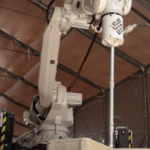Researchers in Portugal are using Gallium–carbon composites for 3D printing sensor-heater-battery systems in wearable electronics. These applications require flexible, durable materials that maintain functionality under strain. Gallium-based liquid metals (LMs) are ideal for these applications due to their high conductivity and fluidic deformability. However, printing gallium-based LMs poses challenges due to their low viscosity and high surface tension.

The team have developed a gallium-carbon black-styrene isoprene block copolymer (Ga–CB–SIS) composite to address these issues. This composite is cost-effective and sustainable, substituting metals like silver with carbon. It is digitally printable and sinter-free, eliminating the need for thermal sintering and enabling multilayer 3D printing. The composite also features excellent adhesion to various substrates, including heat-sensitive materials.
Ga–CB–SIS can serve multiple functions, including as interconnects, sensors, heaters, and electrodes for energy storage. It possesses self-healing properties upon exposure to solvent vapor, facilitating effective circuit repair. Moreover, the composite is recyclable, with gallium recovery demonstrated using a deep eutectic solvent (DES).
The composite’s development involved optimizing the CB/Ga ratio to balance conductivity and mechanical integrity. A CB/Ga ratio of 0.043 was found optimal, achieving low resistance and stable behavior under strain. This ratio also ensured printability and stretchability, making the composite suitable for various applications, including low-resistance heaters, batteries, and electrical interconnects.
Overall, Ga–CB–SIS represents a sustainable solution for 3D printing in wearable and recyclable electronics, integrating sensor, battery, and heating functionalities into a single device. The composite’s properties and printability open doors for innovative applications in flexible and stretchable electronics.
You can read the full research paper, titled: Gallium–Carbon: A Universal Composite for Sustainable 3D Printing of Integrated Sensor–Heater–Battery Systems in Wearable and Recyclable Electronics, from the University of Coimbra over at this link.









